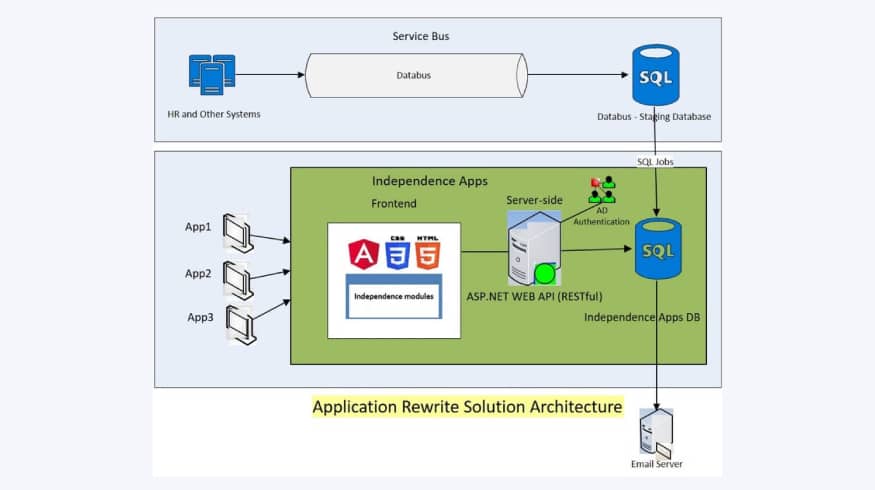

Client
A leading global standards organization
Goal
Improve coordination across teams, reduce delivery delays, and streamline support processes for global users
Tools and Technologies
.NET Core, Vue.JS, Python, Docker, Kubernetes, Azure, Angular, Cosmos DB, MS SQL Server, PowerBI, Redis, Azure Functions, Azure Data Factory, Azure App Service, Spring Boot, Java
Business Challenge
The IT ecosystem was spread across multiple vendors and in-house teams, creating significant coordination overheads and challenges. These issues led to member organizations expressing dissatisfaction due to delivery delays and high turnaround times on incidents and problems.
The teams also had to support users across various geographies and time zones, further complicating operations. A lack of standardized customer service processes and knowledge base documentation also hindered issue resolution. Additionally, the teams struggled with awareness of client-specific standards and applications, while needing to handle ad hoc requests and support teams with customer service-specific projects.

Solution
- Three-week discovery phase and six-month transition plan covering 10+ applications, 24/7 Level 2 support, and infra support
- Established service and operations management processes, including governance, tools, and KPIs for agile and ITIL processes
- Set up and maintained Freshdesk ticketing system to manage user requests
- Created detailed SOPs and canned messages in Freshdesk for BAU tracking
- SLA collaboration - worked with L3 team to define resolution SLAs for critical tickets
- Created weekly and monthly reports to track requests, issues, and risks
- Set up a standard process with client to handle access-related requests

Outcomes
- Zero downtime deployments
- Faster on-boarding of member organizations
- Continuous reductions in infra costs on quarter-to-quarter basis
- 100% response and resolution SLA that led to 100% customer satisfaction
- Timely access to all applications for business users
- A one-stop shop via Freshdesk for all ticket information and data for all stakeholders
- Expertise on global standards enables ideas and suggestions to optimize the process for continuous improvement

Our experts can help you find the right solutions to meet your needs.
Unified automation strategy enhances efficiency



Client
Leading payroll and HR solutions provider
Goal
Develop automation strategy and framework that accommodates growth and ensures efficiency
Tools and Technologies
Ansible, AWS, Dynatrace, Gremlin, Groovy, Jenkins, Keptn, KICS, Python, Terraform
Business Challenge
The SRE (Site Reliability Engineering) shared services team faced a diverse set of needs relating to automation of infrastructure and services provisioning, configuration, and deployment.
The team was encountering resource constraints, as limited in-house expertise in certain automation tools and technologies was causing delays in meeting critical automation requirements. They also needed to ensure system reliability and were challenged to scale automation solutions to accommodate increasing demands as operations grow.

Solution
- Development of a comprehensive automation strategy to align with objectives, encompassing Terraform, Ansible, Python, Groovy, and other relevant technologies in the AWS environment
- Leveraging our expertise to bridge the knowledge gap, provide training, and augment the client team in handling complex automation tasks
- Implementation of a chaos engineering framework using Gremlin, Dynatrace, Keptn, and EDA tools, to proactively identify weaknesses and enhance system resilience
- Creation of a scalable automation framework that accommodates growing needs and ensures long-term efficiency

Outcomes
- A unified automation strategy that streamlined processes, reduced manual effort, and enhanced overall efficiency by 30%
- The implementation of chaos engineering and self-healing practices, which increased reliability between 20% and 50%
- A reduction in manual interventions along with improved efficiency that will result in cost savings of 25% - 50%

Our experts can help you find the right solutions to meet your needs.
Release automation reduces testing time by 80%



Client
A leading multi-level marketing company
Goal
Shorten the release cycle and improve product quality
Technology Tools
Amazon CloudWatch, Elasticsearch, Bitbucket, Jenkins, Amazon ECR, Docker, and Kubernetes
Business Challenge
The client's Commercial-off-the-shelf (COTS) applications were built using substandard code branching methods, causing product quality issues. The absence of a release process and a manual integration and deployment process were elongating release cycles. Manual configuration and setup of these applications were also leading to extended downtime. Missing functional, smoke, and regression test cases were adding to the unstable development environment. The database migration process was manual, resulting in delays, data quality issues, and higher costs.

Solution
- Code branching and integration strategy for defects / hotfixes in major and minor releases
- Single-click application deployment, including environment creation, approval and deployment activities
- Global DevOps platform implementation with a launch pad for applications to onboard other countries
- Automated configuration and deployment of COTS applications and databases
- Automation suite with 90% coverage of smoke and regression test cases
- Static and dynamic analysis implementations to ensure code quality and address configuration issues

Outcomes
Automation of release cycles delivered the following benefits to the client:
- Release cycle shortened from once a month to once per week
- MTTR reduced by 6 hrs
- Downtime decreased to <4 hours from 8 hours
- Product quality and defect leakage improved by 75%
- Testing time reduced by 80%
- Reach expanded to global geographies
- Availability, scalability, and fault tolerance enhanced for microservices-based applications

Our experts can help you find the right solutions to meet your needs.
Order management platform transformation



Client
Multinational publishing, media, and educational company
Goal
Improve order management and transaction processing capabilities
Technology Tools
AWS EKS, Kong, Salesforce Commerce Cloud (SFCC), Salesforce CRM, Jenkins, Sumo Logic, Datadog
Business Challenge
The client's order management platform was complex and had scalability issues, causing poor customer experience and loss of revenue. The platform was hosted on Oracle cloud, with data stored in different repositories. Services were also hosted in the Oracle cloud, which used the BICC extract to fetch information about order details from Oracle databases. The low performance of customer-facing applications was causing latency and very high transaction processing time.

Solution
Team Iris transformed Oracle-based SOA services into six microservices and migrated them to AWS EKS for autoscaling with self-healing and monitoring capabilities.
We developed services for publishing data to Salesforce CRM for quick order processing and conversions. The BICC system for diversified information and order history was enabled with real-time integration between Oracle Fusion and materialized views for data consumption.
Post migration, these services were registered in Kong for discovery, and a CI/CD pipeline was created for deployment using Jenkins. Sumo Logic was used for monitoring the logs, and Datadog was used to observe latency, anomalies and other metrics.

Outcomes
The order management platform transformation delivered the following benefits to the client:
- System performance improved by 70%
- Transaction processing capability increased by 4x
- Order processing capabilities were enhanced by 200%
- Total cost of ownership (TCO) was reduced by 30%

Our experts can help you find the right solutions to meet your needs.
Cloud transformation increases business agility


Standards & Membership
Global Standards organization increases business agility
Existing applications supporting the business were built on monolith architecture with high technical debt. Iris transformed over 15 years old monolith applications into microservices with automated integration and cloud deployment to deliver faster MVPs.
Client
A non-profit global organization responsible for developing and maintaining standards, including barcodes with over 115 local member organizations and over 2 million user companies
Business Drivers
To deliver MVPs in shorter cycles, reduce Mean Time for Ticket Resolution (MTTR), and lower the total cost of ownership
Tools and technologies
C#/.NET Core, Python/DJango, NodeJS/Express, Azure WAF, Azure APIM, App Services, Azure Kubernetes Service, Azure Monitor, Application Insights


BUSINESS CHALLENGE

SOLUTION
Azure cloud offered some of the foundational features like container orchestration, app engine, integration, API gateway, monitoring and others, making cloud-specific modernization a natural choice.
Modernization strategy involved reverse engineering of on-premise applications, domain-specific grouping the product backlogs by, adopting domain-driven design, and using open source cloud-friendly software with CI/CD pipeline. We transformed the applications to a .NET core framework using cloud-native design principles on Azure cloud. The solution was developed using Azure App Services, front door and service bus following the agile development approach with two-week sprints.

OUTCOMES
Iris helped the client realize multiple business benefits, including higher agility, resiliency and cost-efficient IT operations. Key outcomes of this cloud modernization engagement are:
- Reduction in Mean Time for Ticket Resolution (MTTR) by 30%
- Increase in application and infrastructure uptime to 99.9%
- Real-time visibility of application and infra metrics
- Enabled bi-weekly MVP delivery
Contact
Our experts can help you find the right solutions to meet your needs.
Get in touchPandemic pivot from physical to online tests

Client
A leading U.S.-based educational testing and assessment services company
Goal
Switch from in-person to online testing
Tools and technologies
AWS Serverless, Dynamo DB, Node.js, Typescript, Java, Jenkins, and Angular


BUSINESS CHALLENGE
Our client, which provides educational testing and assessment services, faced an existential threat with the pandemic-era lockdowns and social distancing
requirements. The testing centers it operated at physical locations were unable to open, leaving thousands of students worldwide in a state of uncertainty.
Our client had to switch from in-person testing centers to a digital-first or online
testing solution almost overnight. To achieve that, it had to migrate rapidly from legacy systems to the cloud. It also needed to ensure the sanctity and accuracy of its tests while delivering a seamless digital experience to its customers. Other challenges included the ability to dynamically scale up or scale down capacity in response to demand, maintain acceptable service levels, and enable thousands of
expert test raters’ to access and evaluate tests.

SOLUTION
Iris Software stepped in to facilitate a strategic digital pivot in the business model to secure the company’s future. Modernization efforts that were underway at the company even before the pandemic were accelerated as a digital upgrade became imperative. We shifted the data stored on legacy infrastructure was to the cloud. Our team developed a new testing interface that would work overnight across devices, geographies, and different internet connections. Switching the testing operations to the cloud with scalable capacity could help manage the surge in the number of users for the tests Iris also deployed automation and AI tools to deliver superior experiences for test raters. Those who faced challenges while attempting to grade tests were provided with an always-on AI-based solution to automate the troubleshooting and ticketing process.

OUTCOMES
The client now has scalable, digital-first testing capabilities to meet all its testing requirements.
- Cloud-based testing ensures that students, evaluators, and employees have access on-demand.
- The remote testing options are accurate, secure and safe from external threats.
- A strong focus on automation and user experience has allowed for optimized online offerings.
- Surges in demand for tests can be met rapidly and at scale with minimal intervention.
- Thanks to the always-on cloud offerings, service levels are easily maintained.
- The successful digital pivot has led to strong interest in a hybrid operating model to safeguard the business from threats in the future.
Related Stories

Enterprise-Grade DevOps for Scalable Blockchain DLT
Achieve scalability, resilience, and high availability in blockchain DLT platforms with enterprise-grade DevOps & SRE.

Faster go-to-market with no-code API solutions
Discover how Iris enabled a leading home insurance enterprise to accelerate time-to-market by 40% using a no-code API integration strategy.

Enhanced executive dashboard for streamlined reporting
Discover how a leading specialty insurer improved user experience and efficiency by redesigning their executive dashboard into a centralized reporting hub.
Contact
Our experts can help you find the right solutions to meet your needs.
Get in touchA legacy portfolio gets a makeover



Conquering the cloud
Iris developed a multi-device mobile ticketing and permitting application that seamlessly integrated with local government systems using cloud technology for more efficient law enforcement.
Conquering the cloud
Iris developed a multi-device mobile ticketing and permitting application that seamlessly integrated with local government systems using cloud technology for more efficient law enforcement.
Conquering the cloud
Iris developed a multi-device mobile ticketing and permitting application that seamlessly integrated with local government systems using cloud technology for more efficient law enforcement.
Title

Title

Title
Client
The client is one of the Big Four advisory firms.
Goal
Modernize the legacy application to meet growing business needs.
Tools and technologies
MS SharePoint, MS .Net and MS SQL Server.


BUSINESS CHALLENGE
- Lack of integration: Most of the integration with upstream and downstream systems was manual, resulting in common data getting obsolete quickly.
- The client was finding it difficult and expensive to hire and retain resources to maintain the legacy apps.
- The legacy system was prone to security breaches and couldn’t be deployed on the enterprise-level stack.
- The existing system supported only single-user applications, and it wasn’t possible to roll them out to multiple users.

SOLUTION
- Upgraded the technology stack for the application(s) to lower maintenance costs, improve efficiency and meet growing business needs.
- Used an in-house technology modernization framework to reduce development and maintenance costs.
- Consolidated applications that were doing similar tasks and had similar features and modernized them.
- Retired applications, whose features were available through other applications.

OUTCOMES
- With the legacy modernization and application consolidation process, we reduced the client’s application portfolio from 45 applications to less than 10.
- Reduced the resources required for maintenance from six to two.
- The framework-based approach accelerated time-to-market, a critical differentiator for the client.
Related Stories

Enterprise-Grade DevOps for Scalable Blockchain DLT
Achieve scalability, resilience, and high availability in blockchain DLT platforms with enterprise-grade DevOps & SRE.

Faster go-to-market with no-code API solutions
Discover how Iris enabled a leading home insurance enterprise to accelerate time-to-market by 40% using a no-code API integration strategy.

Enhanced executive dashboard for streamlined reporting
Discover how a leading specialty insurer improved user experience and efficiency by redesigning their executive dashboard into a centralized reporting hub.
Contact
Our experts can help you find the right solutions to meet your needs.
Get in touchSetting a high standard for member experience

Client
One of the world’s leading retail standards organizations.
Goal
Build a 24x7 cloud-based platform capable of storing and sharing data on billions of products.
Tools and technologies
Java, Python, NodeJS, .NET, Azure PostgreSQL, Azure SQL, MongoDB, Redis, Azure DevOps, Pipelines, Git, Docker, Kubernetes and Azure App Service.


BUSINESS CHALLENGE
Our client is a global standards organization. Its products and codes are used by millions of brand owners, retailers and supply chain partners around the world.
The organization needed an always-on, scalable cloud-based platform capable of storing and sharing data on billions of products and related information with members and partners across the world.
The client also wanted the ability to onboard member organizations quickly and seamlessly.
They wanted the business capabilities developed on a platform to be available as modern and secure enterprise-level APIs.

SOLUTION
We chose a microservices architecture for high agility, loose coupling, independent deployability and maintainability.
We followed an API design-first approach and designed according to the standards-based API specification (OpenAPI Specification).
In line with best practices for securely publishing and maintaining APIs, our team deployed the Azure API management solution. We used Azure APIM developer portal to deliver a superior developer onboarding experience. The solution had other features as well:
- Design and implementation of the Azure Virtual network for securely hosting the platform.
- A cloud-native architecture using the Azure AppService and an Azure-managed Kubernetes platform.
- Comprehensive performance testing and optimization at all levels to meet strict SLAs.
- Security testing and vulnerability assessment to ensure secure APIs.

OUTCOMES
- A robust and secure API platform that handles 200,000 API requests per day
- 50 million codes uploaded in 40 product categories across more than 130 countries
- Delivered a developer portal for quick onboarding of application developers
- New 7-step verification mechanism led to the creation of new revenue streams
Related Stories

Enterprise-Grade DevOps for Scalable Blockchain DLT
Achieve scalability, resilience, and high availability in blockchain DLT platforms with enterprise-grade DevOps & SRE.

Faster go-to-market with no-code API solutions
Discover how Iris enabled a leading home insurance enterprise to accelerate time-to-market by 40% using a no-code API integration strategy.

Enhanced executive dashboard for streamlined reporting
Discover how a leading specialty insurer improved user experience and efficiency by redesigning their executive dashboard into a centralized reporting hub.
Contact
Our experts can help you find the right solutions to meet your needs.
Get in touchStriking the right balance of care

Client
A leading provider of work-life services to caregivers.
Goal
Enable caregivers to easily set up and manage care schedules.
Tools and technologies
HTML, CSS, JavaScript, Bootstrap, JQuery, Atlassian User Interface (AUI), AngularJS and Liferay DXP7.2


BUSINESS CHALLENGE
Many young and middle-aged workers combine both work and caregiving responsibilities that cover not only children but extend to parents and pets. Research shows that employees who achieve greater work-family balance are more satisfied in their jobs and happier with their families.
For our client, a leading provider of work-life services, the key to enabling that balance is the setting up of care schedules for dependent or vulnerable family members. The client’s existing solution for managing such schedules, however, was not user-friendly, flexible, or mobile-responsive.
The client's websites offered no provision to schedule premium services for care.
The websites were served by a Liferay V6.2 content management system (CMS) as the common backend for which support ended in December 2020.

SOLUTION
We designed and developed a web platform for scheduling care for family members including parents, children, self and pets, with e-mail notifications and quick access to customer care. We migrated the websites to Liferay DXP7.2 CMS backend.
To improve the performance of the web application, we developed website forms as AngularJS-based single-page applications. We developed a responsive website that worked flawlessly across different-sized screens on desktops, tablets and mobile phones.
We used Agile methodologies right from the requirements-gathering phase until the final deployment of the web platform to shorten development time.
To save cost and time, we used an almost identical codebase for both iOS and Android platforms (except for a few configuration settings and device specific features).
Furthermore, our team performed continuous integration using automated build tools, and script and code repositories, to save time during the development, testing and deployment phases.
We ensured that the sites we built followed the WCAG 2.0 and OWASP accessibility and security standards.

OUTCOMES
- The web platform we developed ensured the client’s care scheduling interface was user-friendly, flexible and mobile-responsive.
- Customers could easily create, change and cancel schedules. They also had easy access to records and historical data.
- The common codebase across iOS and Android ensured significant cost savings in the development and maintenance of the application.
- Agile methodologies and a high degree of automation reduced costs and shortened the development time.
Related Stories

Enterprise-Grade DevOps for Scalable Blockchain DLT
Achieve scalability, resilience, and high availability in blockchain DLT platforms with enterprise-grade DevOps & SRE.

Faster go-to-market with no-code API solutions
Discover how Iris enabled a leading home insurance enterprise to accelerate time-to-market by 40% using a no-code API integration strategy.

Enhanced executive dashboard for streamlined reporting
Discover how a leading specialty insurer improved user experience and efficiency by redesigning their executive dashboard into a centralized reporting hub.
Contact
Our experts can help you find the right solutions to meet your needs.
Get in touchIndustries
Company




